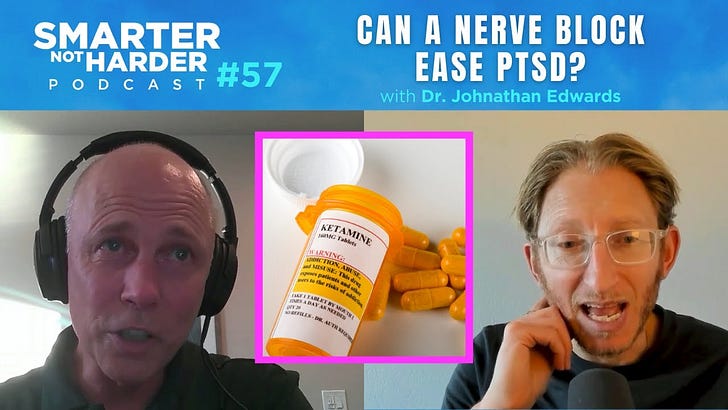Smarter not Harder Health Optimization Podcast
I recently recorded a podcast with Dr. Scott Sherr, a longtime friend and a physician at Health Optimization Medicine (HOMe), which was founded in the Philippines by Dr. Theodore Achacoso. We discussed several topics, including Stellate Ganglion Blocks, Ketamine, and Percutaneous Hydrotomy.
As we explore innovative treatments within mental health, a remarkable therapy is emerging for those affected by PTSD and depression: Ketamine Therapy. Once known primarily as an anesthetic, ketamine is now breaking new ground as a promising approach to mental health challenges that are often resistant to traditional treatments.
In this episode of the Smarter Not Harder Podcast, host Dr. Scott Sherr is joined by guest Dr. Johnathan Edwards to give one-cent solutions to life’s $64,000 questions that include:
What is a stellate ganglion block, why should we be using it, and how has its usage in healthcare evolved over time?
What is ketamine, its history of use, and its mechanisms? How has ketamine therapy come to impact the mental health space? Is intravenous or oral treatment more effective?
What is percutaneous hydrotomy and how did Dr. Edwards become interested in it? How does percutaneous hydrotomy relate to mesotherapy and how does it relieve pain?
Stellate ganglion blocks (SGB) have been around for years and have recently been found to help PTSD and mental health. These blocks have come a long way. They used to be performed blindly using anatomical landmarks, but today, SGBs are performed under visual guidance using ultrasound. The stellate ganglion is a collection of autonomic nerves forming part of the Vagus nerve. Local anesthetics are medicines that block nerves, and they can be used to block the stellate ganglion. The result is less sympathetic nerve flow, making a patient more relaxed. Some patients describe that a weight is lifted from their shoulders, and they feel like they can relax for the first time in years. Another recent podcast covering stellate ganglion blocks is on the Jordan Peterson podcast with Dr. Adeel Khan.
Then Dr. Scott and I discussed my book, The Revolutionary Ketamine. We discuss Ketamine's creation, how it was used as a buddy drug in the Vietnam War, and how it became the world's most important anesthetic. Even today, it's listed on the WHO list of essential medications because it provides anesthesia in rural areas without needing oxygen and blood pressure medications. We dive into Dr. Lori Calabrese's work on Ketamine and suicide, where she showed that Ketamine is effective in stopping suicidal ideation in an outpatient clinic setting. Her work is fantastic and she recently presented at the Metabolic Health Conference that a ketogenic diet, along with Ketamine and therapy, is super effective in treating mental illness and eating disorders. Check out her website and papers here.
https://www.loricalabresemd.com/ketogenic-diet-and-ketamine-infusions-for-anorexia/
Then Dr. Scott and I dive into the neurotransmitter glutamate and how psychedelics increase it. Dr. Mark Matson wrote an important book about glutamate and was recently interviewed on STEM TALK episode 163 by Dr Ken Ford and Dawn Kernagus. Glutamate is our brain chemical. My next podcast is with Dr. Ken Ford and Dr. Dawn Kernagus on STEM TALK. Stay tuned!
Then, we discuss my newest book, Stopping Pain and treating chronic pain Using the technique of percutaneous hydrotomy. In Stopping Pain, I show that a little-known technique called percutaneous hydrotomy is derived from the French mesotherapy method and is defined by its inventor Dr. Michel Pistor. Mesotherapy is known as an aesthetic treatment for dissolving fat. But its first indication is the treatment of chronic pain. I highlight with Dr. Scott that percutaneous hydrotomy is an excellent adjunct to the multi-modal treatment of chronic pain. It's not a panacea. Percutaneous hydrotomy works by placing a large amount of physiological saline, vitamins, minerals, medications over the area of pain. This creates a depot of slowly releasing medications and vitamins to the diseased area and cells. The concept is nothing new; it's used in administering monoclonal antibodies and the drug for rheumatoid arthritis called Humira.
We talked about how percutaneous hydrotomy is a technique that borders on allopathic and alternative medicine. Thousands of patients have benefited from percutaneous hydrotomy in France and throughout Europe.
Percutaneous hydrotomy and all alternative medicine techniques are currently under attack in France by the directives proposed by the Ministry of Health. The story is something directly out of George Orwell's book 1984. It amounts to medical freedom and choice. If you are interested, I wrote a series of articles called Nurturing Democracy and the Freedom of Medical Choice on this Substack.
I hope that you find the podcast interesting. Please reach out if you have any questions. Here are the links for the podcast.
Episode 57: Dr. Johnathan Edwards Links! Please Share :)
HH website: https://homehope.org/blogs/podcast/drjohnathanedwards
Tx website: https://troscriptions.com/blogs/podcast/drjohnathanedwards
HH YouTube:
Tx YouTube:
Spotify:
Apple Podcasts:



